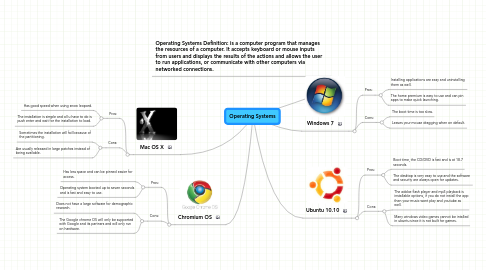
1. Operating Systems Definition: is a computer program that manages the resources of a computer. It accepts keyboard or mouse inputs from users and displays the results of the actions and allows the user to run applications, or communicate with other computers via networked connections.
2. Chromium OS
2.1. Pros:
2.1.1. Has less space and can be pinned easier for access.
2.1.2. Operating system booted up to seven seconds and is fast and easy to use.
2.2. Cons:
2.2.1. Does not have a large software for demographic research.
2.2.2. The Google chrome OS will only be supported with Google and its partners and will only run on hardware.
3. Mac OS X
3.1. Pros:
3.1.1. Has good speed when using snow leopard.
3.1.2. The installation is simple and all u have to do is push enter and wait for the installation to load.
3.2. Cons:
3.2.1. Sometimes the installation will fail because of the partitioning.
3.2.2. Are usually released in large patches instead of being available.
4. Windows 7
4.1. Pros:
4.1.1. Installing applications are easy and uninstalling them as well.
4.1.2. The home premium is easy to use and can pin apps to make quick launching.
4.2. Cons:
4.2.1. The boot time is too slow.
4.2.2. Leaves your mouse dragging when on default.
5. Ubuntu 10.10
5.1. Pros:
5.1.1. Boot time, the CD/DVD is fast and is at 18.7 seconds.
5.1.2. The desktop is very easy to use and the software and security are always open for updates.
5.2. Cons:
5.2.1. The adobe flash player and mp3 playback is installable options, if you do not install the app then your music wont play and youtube as well.
5.2.2. Many windows video games cannot be intalled in ubuntu since it is not built for games.
